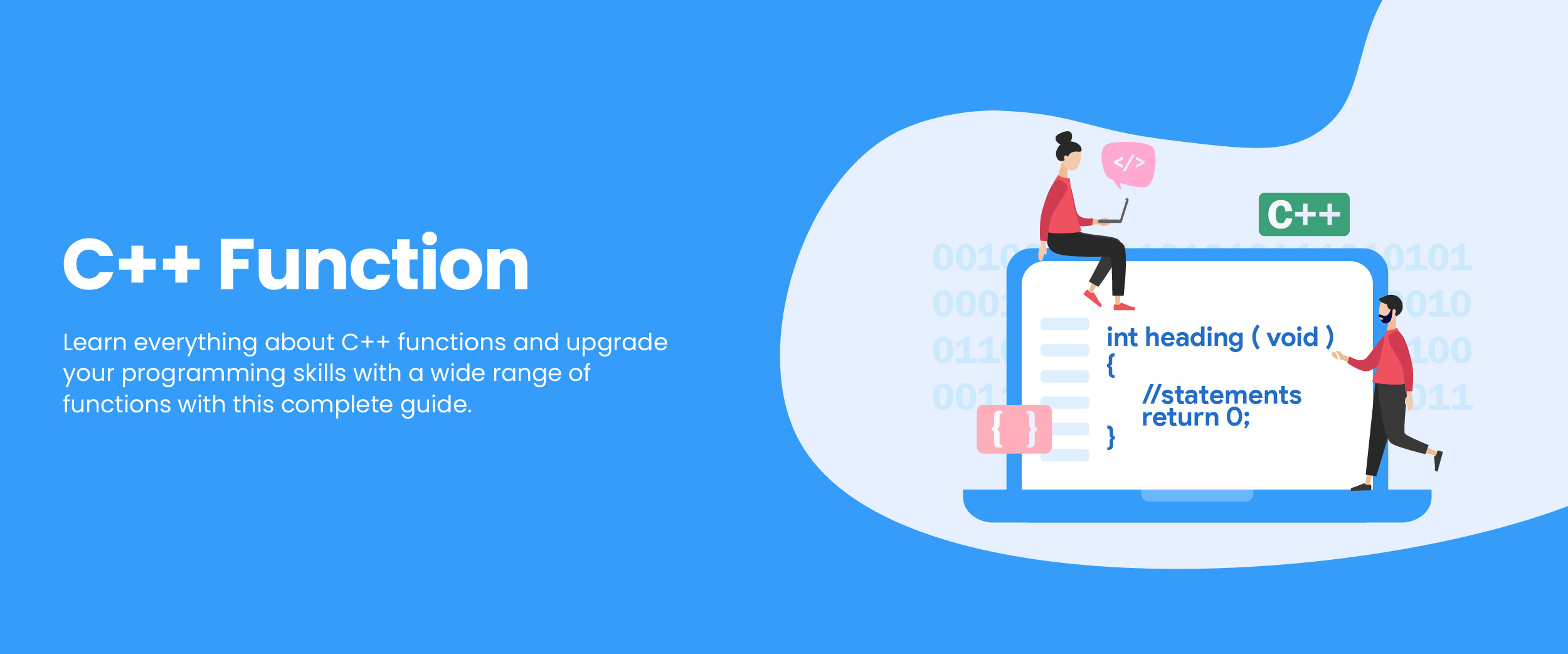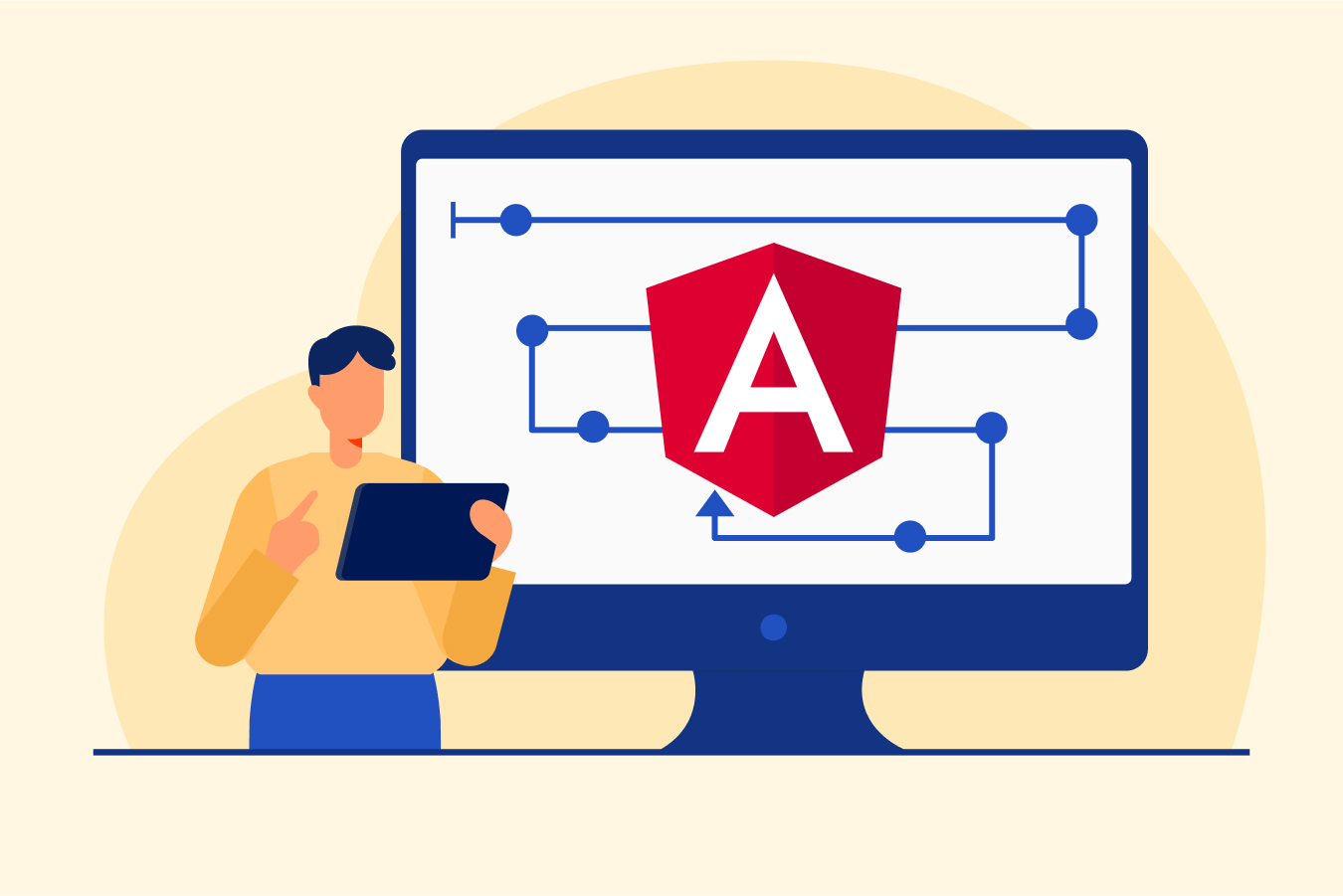What is C++ Function? – A Comprehensive Guide
C++ is an object-oriented programming language developed by Bjarne Stroustrup. It is currently the 4th most popular programming language behind Python, Java, and C. Functions are the basic building blocks of C++ programs. Knowing how to use them effectively will help you save time in the development process.
C++ supports classes that allow programmers to group related data and functions together, making cleaner code easier to read and maintain. Because of its simplicity and ease of use, it is used in companies like Microsoft, Google, and Facebook. So, let’s understand what are C++ functions.
What is C++?
C++ is a popular programming language with greater flexibility, power, and performance. It offers many features, such as classes, data abstraction, polymorphism, encapsulation, and function overloading, which makes it ideal for complex software development projects. It is also used extensively in game development and other areas of computing, such as embedded systems. The syntax of the language is based on the C programming language, so it can be quickly learned by developers who are already familiar with this code type.
Parts of a Function
The following are several parts of functions:
- Defining a Function: A function is defined in C++ with the keyword ‘function’, followed by the name of the function, its parameters, and its return type. The parameters specify what data is passed into the function when it is called and can be either values or variables. The return type specifies what value is returned from a successful call to the function, such as an integer or Boolean value.
- Parameter Passing: Parameters are passed to functions using several methods depending on their data types. Data types like integers, floats, or characters can be passed directly as values, while objects like classes need to be passed by reference using pointers or references. This allows for greater flexibility when working with complex objects and enables functions to modify their contents within themselves without affecting other parts of the code.
- Return Type: The return type specifies what value should be returned from a successful call to the function. Different values may require different types, such as integers for numeric results, Booleans for true/false outcomes, and strings for textual results. This return type must match up with whatever was expected for accurate programming to occur. Otherwise, unexpected results could occur, leading to bugs in your program later due to potential mismatches between expectations and actual returns.
Types of Functions
There are different types of functions in C++. Some of them are:
- Functions with no Arguments: Functions that don’t require any arguments are known as ‘void functions.’ These functions do not take any input from the user and execute a specific set of instructions. A great example of this type of function is a print statement, which takes in no parameters and prints out whatever was specified when it was called.
- Functions with Arguments: Functions that require arguments to work correctly are referred to as parameterized functions. Each argument must be given its type, such as an integer or float before it can be used within the function body. This enables more complex operations like math calculations or data manipulation to occur with greater accuracy than would otherwise be possible without these parameters being inside the codebase itself.
- Inline Functions: Inline functions are special types of code blocks that allow small pieces of code to be quickly executed without taking up too much space. Generally, they will only contain one line per statement but can still have multiple lines depending on what kind of task they must perform at runtime.
- Static Functions: Static functions retain their state even after they have been exited from execution time. It means that anything declared within their scope remains until either explicitly changed somewhere else in your program’s source files or until it is closed entirely afterward. This leaves variables unchanged throughout consecutive calls made towards them over subsequent runs.
To learn more about these functions, you can opt for an in-depth C++ course.
Advantages of C++ Functions
Some of its advantages are as follows-
- Reusability: One of the main advantages of using functions in C++ is that they enable code to be reused, which can save a great deal of time and effort. Functions can be written once and then called multiple times throughout the program, making it much easier to maintain an application. This also reduces the amount of duplicated code as functions are only written once and used multiple times instead of having to recreate identical blocks elsewhere inside your source files. Therefore, it helps reduce potential errors made during manual copying/pasting procedures.
- Encapsulation: Another advantage is that functions help with encapsulation, meaning that certain pieces of code are hidden away from other parts so they cannot interfere or cause unexpected behavior. This helps keep programs clean and organized by allowing developers to separate different tasks into their distinct areas within the overall structure. It makes them more manageable due to greater levels of abstraction being applied to them afterward as needed for future development cycles.
- Easy Debugging: Debugging a program becomes significantly easier when sections have been divided up into individual functions rather than one large body of code. As issues become more isolated, it makes identifying and resolving problems quicker since you know exactly where everything’s located. It prevents wasting extra time.
- Modularity: Lastly, coding with functions enables programs to be broken down into smaller modules known as ‘modules,’ which can then be tested independently before being combined. This allows for a faster debugging process since individual components can quickly be identified if something goes wrong. It helps save hours or even days compared to testing an entire system all at once from start to finish every single time.
Syntax of C++ Functions
Now, let’s have a deeper look at the syntax of different C++ functions.
1. Function Declaration
Function declarations are the first step to using functions in C++ and involve declaring a function’s name, parameters, and return type. This tells the compiler what kind of data is expected when calling the function as well as what kind of value it should expect to receive back upon completion. Parameters should be declared with their respective data types, and the return type can be void or another valid data type, depending on the expected output during runtime.
Syntax:
returnType functionName (parameter1, parameter2,...) {
// function body
}Sample Code:
In the below example, we have declared a function with name greetuser(). To use this greet() function, we are required to call it.
Here’s how we can call this greetuser() function.
#include <iostream>
using namespace std;
// declaring a function
void greetuser() {
cout << "Hello there!";
}
int main() {
// calling the function
greetuser();
return 0;
}2. Function Definition
Once declared, a function needs to be defined, which involves writing out all of its code within curly braces `{}`. This refers to various codes, ranging from basic text displays to complex algorithms, involving mathematical equations that manipulate objects.
Syntax:
void TestFunction() { // declaration
// the body of the function (definition)
}Sample Code:
You will frequently see C++ programs that contain function declaration above main(), with function definition below main(). This technique will make your code more organized and easier to read. See the below program:
#include <iostream>;
using namespace std;
// Function declaration
void TestFunction();
// The main method
int main() {
TestFunction(); // call the function
return 0;
}
// Function definition
void TestFunction() {
cout << "Woah, I got executed!";
}3. Calling a Function
A function can only be used once it has been properly declared and defined beforehand. Otherwise, an error will occur. To use a function, you simply need to write out its name followed by parentheses (if arguments were specified) then pass in whatever was required into them.
Functions can be called by two methods.
- Function Call by Value – In this, changes to the arguments are not reflected outside the function.
Sample Code:
For example, think about a function that swaps two numbers. Here, we can see that the values of number1 and number2 are only modified within the function. Since the swap function was invoked by value, its call has no impact on the values of number1 and number2, outside of it.
#include<iostream>
using namespace std;
void swap( int number1, int number2)
{
int temp=number1;
number1=number2;
number2=temp;
// values of num1 and num2 are swapped inside the function
cout<<"Inside function: "<<number1<<" "<<number2<<endl;
}
int main()
{
int number1 = 1, number2 = 2;
swap(number1,number2); // function call by value
// values of num1 and num2 were swapped inside the function but
// here (outside the function) they have their original values
cout<<"Outside function: "<<number1<<" "<<number2<<endl;
}- Function Call by Reference – Changes made to the arguments in the function are reflected outside the function too.
Sample Code:
Let’s use the same swap function from the earlier example to illustrate this.
Using the & operator, we can pass a variable’s address. We will have pointer-type parameters in this example because pointers are used to store the address of a variable. We can see that changes are made to number1 and number2 values outside of the swap function.
#include<iostream>
using namespace std;
void swap( int *number1, int *number2)
{
int temp=*number1;
*number1=*number2;
*number2=temp;
cout<<"Inside function: "<<*number1<<" "<<*number2<<endl;
}
int main()
{
int number1 =1, number2 =2;
swap(&number1,&number2); // function call by reference
cout<<"Outside function: "<<number1<<" "<<number2<<endl;
}Additional Concepts in C++
Some additional concepts which might help while using C++ are mentioned below.
- Function Overloading: Function overloading is a concept in C++ that allows for multiple functions to have the same name but different parameters. This can be used to create more versatile and streamlined code by making it easier to call certain operations without remembering their exact signature.
- Recursion: Recursion is yet another powerful tool available within C++ that involves calling a function inside of itself repeatedly until some specific condition has been met. It allows any given operation to complete its task accurately with minimal manual intervention or oversight.
- Templates: Templates are special types of functions that allow for generic programming techniques, whereby pieces of code can be written once and reused across multiple data types. This allows developers greater flexibility when dealing with dynamic inputs.
Conclusion
C++ has many advantages over other programming languages like Pascal, Java, etc. The syntax is simple, user-friendly, and logical. You can use C++ functions to enhance your program’s efficiency and performance. Let us know in the comments section which language you prefer to code with.






